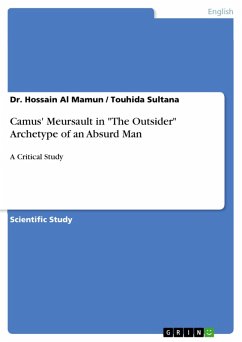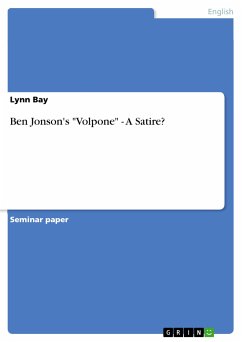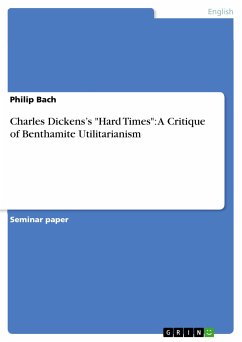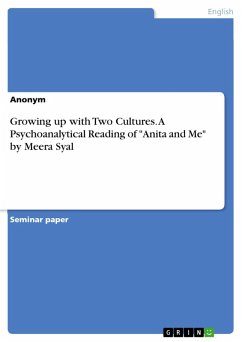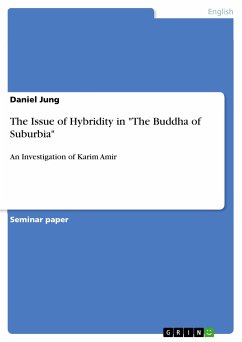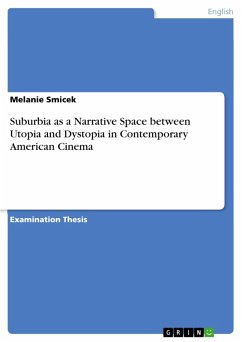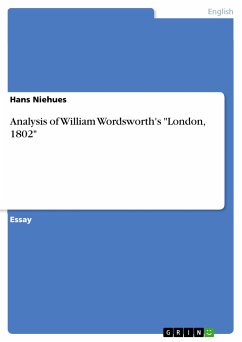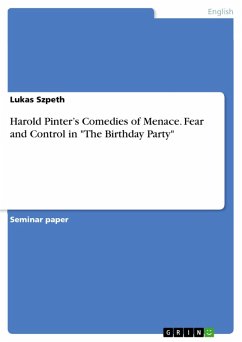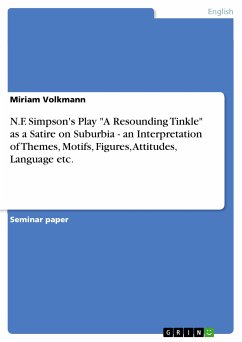
N.F. Simpson's Play "A Resounding Tinkle" as a Satire on Suburbia - an Interpretation of Themes, Motifs, Figures, Attitudes, Language etc. (eBook, PDF)
Sofort per Download lieferbar
15,99 €
inkl. MwSt.

PAYBACK Punkte
0 °P sammeln!
Seminar paper from the year 2003 in the subject English Language and Literature Studies - Literature, grade: 1 (A), University of Frankfurt (Main) (Institute for Anglistics/American Studies), course: British Varieties of the Drama of the Absurd: Pinter, Simpson, Saunders, Campton, language: English, abstract: Literary critics have discussed N.F. Simpson's one-act play A Resounding Tinkle in a controversial manner. A number of them saw it as a representative of the British variety of the "Theatre of the Absurd" (Esslin 1964: passim); others express doubts that there really is a serious philosop...
Seminar paper from the year 2003 in the subject English Language and Literature Studies - Literature, grade: 1 (A), University of Frankfurt (Main) (Institute for Anglistics/American Studies), course: British Varieties of the Drama of the Absurd: Pinter, Simpson, Saunders, Campton, language: English, abstract: Literary critics have discussed N.F. Simpson's one-act play A Resounding Tinkle in a controversial manner. A number of them saw it as a representative of the British variety of the "Theatre of the Absurd" (Esslin 1964: passim); others express doubts that there really is a serious philosophical intent and state that Simpson tries to amuse his audience for more superficial reasons (Fothergill 1973: passim). Leaving these questions aside I will focus on the question whether the one-act version of A Resounding Tinkle can or has to be interpreted as socio-cultural criticism. By analysis of the motifs, characters, structure and language I will try to show in how far Simpson makes allusions to suburbia and satirises the middleclass society. The term suburbia is frequently used by various authors. Most educated readers will have a more or less clear idea of the phenomenon it stands for. It is however difficult to find a full, comprehensive and precise definition of the term in literature. For my analysis it is nevertheless indispensable to define the term suburbia before analysing and interpreting the play. Due to the lack of literature about this topic I have to rely on my own experience with and knowledge about suburbia. Additionally I base my definition on the thorough research work of David Thorns from whose book Suburbia (1972) I give a number of quotations. It is difficult to give a date for the beginning of suburbanisation, but the phenomenon is known since after the Second World War. Urbanisation, having reached a practical point of saturation, lead to suburbanisation, the desire to live in neighbourhoods with green spaces. (During the Industrial Revolution of the late 18th and 19th centuries people had started to move from the country into the cities, which therefore grew at an enormous speed. The quality of life began to decrease in the overcrowded cities. Poverty and lack of space for the individual made living in the cities more strenuous.) [...]
Dieser Download kann aus rechtlichen Gründen nur mit Rechnungsadresse in A, B, BG, CY, CZ, D, DK, EW, E, FIN, F, GR, HR, H, IRL, I, LT, L, LR, M, NL, PL, P, R, S, SLO, SK ausgeliefert werden.




